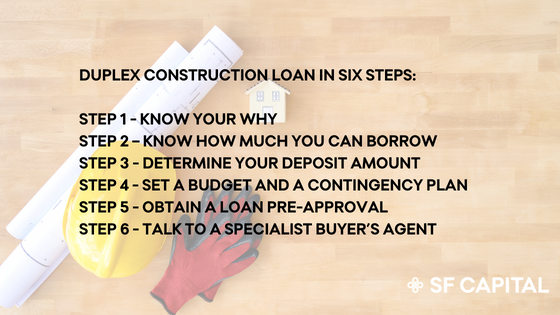
Knowing how to build a duplex on a block of land is one thing. Getting the loan approval for the duplex project is what will make the vision come true.
There are a few sources of funding available for your projects – a loan from a bank, non-bank or private lender. There will be separate loans for the land and construction component.
As with all types of lending there is a risk and return ratio. The more risk the lender is taking on, the softer the requirements may be, but the costs will be higher.
Generally when there are no more than two dwellings, the loan application will be looked at by the bank or non-bank lender’s residential loan department, which means you need to demonstrate the ability to service the loan.
On the other hand, a private lender will have different criteria as they provide short term funding, usually over 3 to 12 months with pre paid interest. Private lenders are more concerned about how you will pay back the principal at the end. They should be considered in exceptional circumstances where timing is of the essence. Or where there is a lot of profit to absorb the higher costs.
What you need to know about getting a duplex construction loan
Here are our top tips on successfully getting funding for your duplex build.
Step 1 – Know what you are looking to achieve in building a duplex
The first step to getting a duplex construction is: “know your why”.
Constructing a duplex, whether you own the land today or not, is a big and expensive project. The construction alone typically costs upwards of a million dollars and it can easily take 12 months or more.
So before you take the plunge into a big project it is essential that you know why you are doing it, and what you are looking to achieve. During this exercise you should naturally evaluate the opportunity cost of your capital. That is, is building a duplex really the best use of your money or is there another way to achieve a similar outcome?
Based on your why, as your broker, we can provide helpful finance related insights. For example we get told by clients they want to build a duplex so they can live alongside family with each side owned separately. We remind these clients that upon completion, to split the loan into two under different names, the respective borrowers must be reassessed and approved.
Another example is if you are building to earn a profit. It is very important to speak with your accountant about the right ownership structure for your situation. You may purchase in your personal name or another entity like a company or trust. It is very important to get the structure right as it is very expensive to undo the wrong structure later. There can be materials impact on your tax obligations and even lending options.
This all being said, with great risk comes great rewards for your duplex construction. So with the right team of professionals around you don’t be scared to lean in!

Step 2 – Know how much you can borrow for the duplex build
The second step is to assess borrowing capacity for the duplex construction.
Generally when there are two dwellings or less, the application will be looked at by the bank or non bank’s residential loan department. This means you need to personally demonstrate the ability to service the loan. This is tested over the term of the loan and under harsh conditions, such as adding a 3% buffer to the actual rate and shading rental income by 20-30%.
If you are a business owner there will be a big difference between how much of your income various lenders include. This also applies to employees that earn variable income such as bonus, commission, overtime or allowance.
So definitely invest the time and effort to find a mortgage broker that specialises in your scenario. It can get complicated and the answers change all the time!
Step 3 – Determine your deposit amount
The third step is to determine how much deposit you have.
Your deposit can be cash savings plus equity in another property. Bear in mind when using equity in property, you are simply taking an additional loan against the increased value of your property.
This means when you use equity in another property, because it is borrowed money, the amount you use comes out of your borrowing capacity.
There is one common mistake we see clients building a duplex make. They believe when assessing the loan for the land and construction, the bank will lend against the as-if complete value.
This is NOT the case because the bank’s valuer will only value it as “one line” or one house, as the subdivision is only completed once construction is completed. The result is a lower valuation – how much lower varies depending on the property and market conditions, 20-30% is the typical reduction we see.
So this means when you apply for the land and construction loans, you need to be prepared with your normal 20% deposit plus an extra 16 to 24%. Upon completion of the build, if you satisfy the lender’s credit criteria at that time, you can obtain a new loan to get the funds back.

Step 4 – Set a budget and a contingency plan
Now that you know how much you can borrow, and how much of a deposit you can contribute, the fourth step is to set a purchase price budget and contingency funds.
Given there is a construction period where you will not be generating income whilst incurring significant costs, it is critical that you set aside contingency funds for:
- construction delays due to bad weather, labour shortage, material/supply issues;
- cost variations, especially for out of contract items given they cannot be secured with a fixed price building contract and the quotes would often expire by the time the construction is complete; and
- for miscellaneous approvals such as the DA or CDC and even the OC, we have seen clients surprised by how long separate utility meters and the NBN take to finalise which delays the OC and ultimately completion.
If you are building a duplex as your home, there is a further consideration of extending your short term accommodation arrangement, whether that is renting, living with family or living in another property etc.
In your budget, you will also need to factor in the transaction costs for the project. Please see section below on the key costs to factor in when taking out a duplex construction loan.
Step 5 – Obtain a loan pre-approval
The second last step is to obtain a pre-approval. By engaging an experienced mortgage broker, we will make sure you only proceed to this step if there is a strong confidence level you would be approved for what you need.
Step 6 – Talk to a specialist buyer’s agent
Given the above parameters are clear, the last but definitely not least step is to talk to a specialist buyer’s agent to determine what potential sites would be within your pre-approval limit and suit your goals.

What are the key costs to factor in when taking out a duplex construction loan?
There are several types of fees that you need to factor into the budget when planning to take our a loan to build a duplex on your property.
1. Architect’s fees
2. DA costs if the site is located in a council area where CDC is not applicable
3. Interest holding costs for the construction period + plus a 3 to 6-month delay
4. At least 10% of the construction + out of contract item costs as a contingency for cost variations
5. Property lawyer fees
6. Buyer agent fees
7. Subdivision costs
8. Quantity surveyor report (especially if you will be keeping the property as investment)
9. Broker fees.
A note on the broker’s fees for a duplex loan
Most brokers charge an assessment fee for arranging a duplex construction loan. This is due to the fact that brokers do not get paid the typical commission for the initial loans if the consequential refinance happens within 12 months. Or brokers get paid only 50% of the typical commission if the refinance happens within 12-24 months.
However, there is a lot of heavy upfront assessment work involved to help clients up to the point of loan submission; and it does happen often that the 24-month timeframe lapses, brokers get paid nothing at all for what might have been value-adding advice over a length process.
Therefore, in line with our industry peers, our broker fees would include the following:
- An upfront assessment fee;
- An application fee upon instruction to submit the loan; and
- A success fee upon land settlement and construction loan formal approval.
Speak to a broker
I hope the above tips are helpful for you in planning for a duplex construction project! Good luck!
If you have any questions about your scenario, you can reach out to the SF Capital Team via email:

